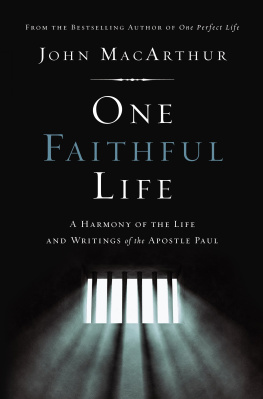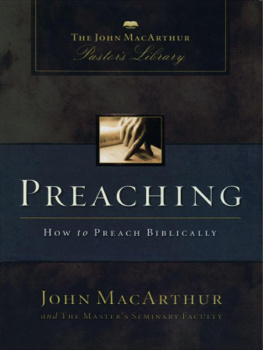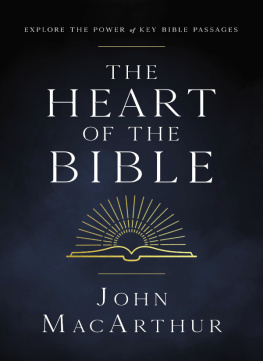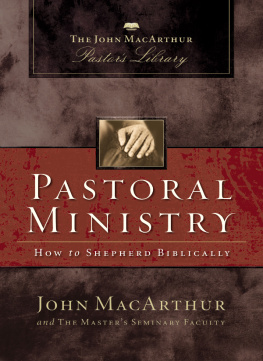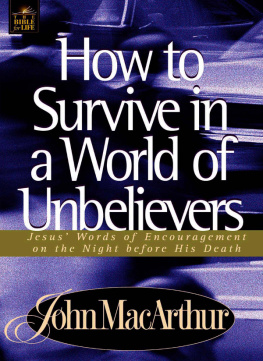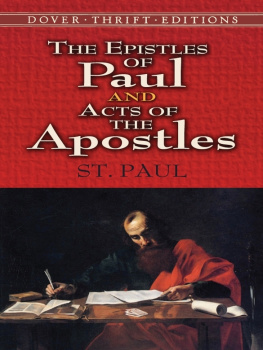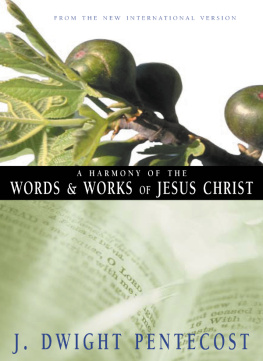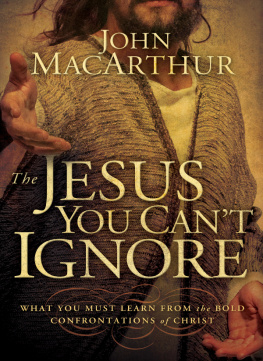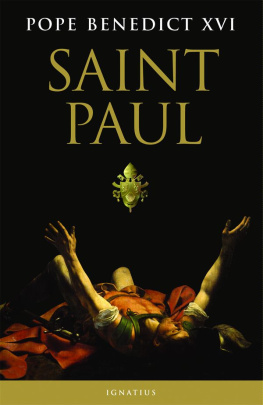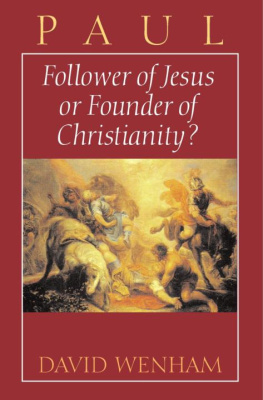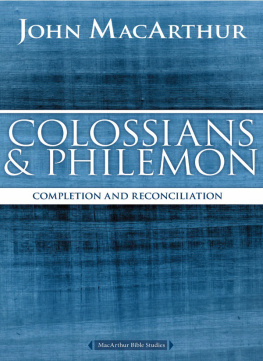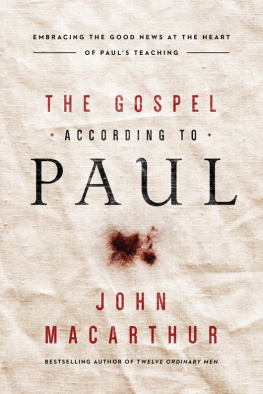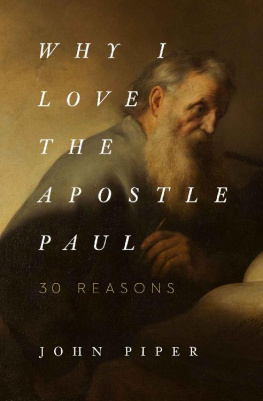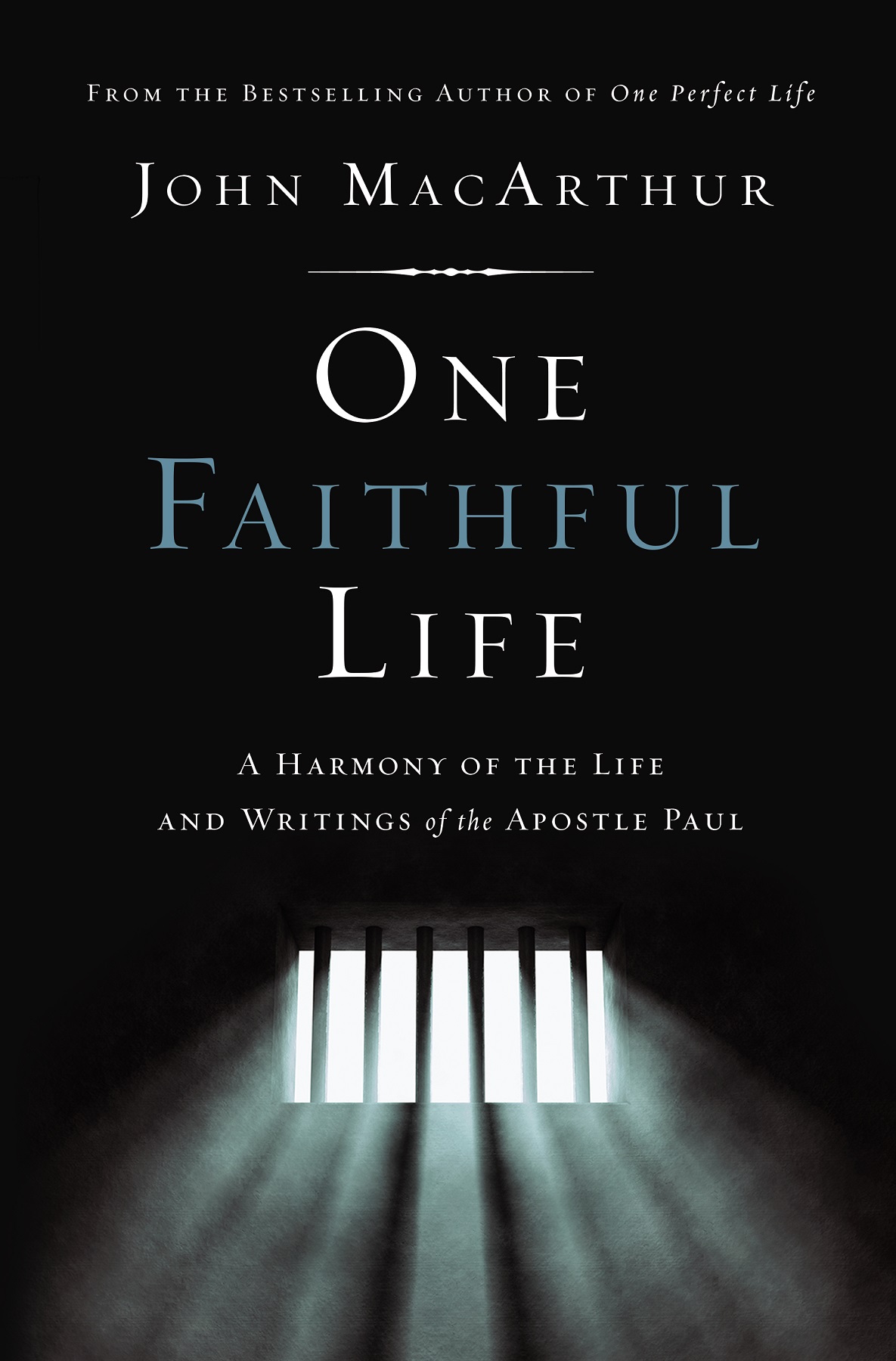
O NE F AITHFUL L IFE
A H ARMONY OF THE L IFE AND L ETTERS of the A POSTLE P AUL
J OHN M AC A RTHUR
General Editor

2019 John MacArthur
Study materials adapted from The MacArthur Study Bible, copyright 1997, 2006 Thomas Nelson.
All rights reserved. No portion of this book may be reproduced, stored in a retrieval system, or transmitted in any form or by any meanselectronic, mechanical, photocopy, recording, scanning, or otherexcept for brief quotations in critical reviews or articles, without the prior written permission of the publisher.
Published in Nashville, Tennessee, by Thomas Nelson. Thomas Nelson is a registered trademark of HarperCollins Christian Publishing, Inc.
Special thanks to Nathan Busenitz and also to the team at Thomas Nelson for their help in the completion of this project.
Thomas Nelson titles may be purchased in bulk for educational, business, fund-raising, or sales promotional use. For information, please e-mail SpecialMarkets@ThomasNelson.com.
Scripture quotations are taken from the New King James Version. 1982 by Thomas Nelson. Used by permission. All rights reserved.
ISBN 9780785229469 (eBook)
ISBN 9780785229261 (HC)
Library of Congress Control Number: 2019930171
ISBN 9780785229261
C ONTENTS
As a bonus, we have included the entire New King James Version Bible text as an , and all Scripture references in the book are hyperlinked to the corresponding Bible verse.
What is the difference between an eBook and a print book?
eBook versions of Bibles contain all the content and supplementary materials found in the original print versions and are optimized for navigation in the various apps and devices used for display. eReaders recognize text as one fluid string and are formatted in a single column, which differs from the multi-column layout seen in many print version Bibles. Therefore, some content may not match the exact appearance of the original print version, but instead uses hyperlinks to navigate between related content.
How do I use the eBook Table of Contents?
* Important Note: Be sure to consult your device manufacturers Users Guide for device-specific navigation instructions. *
The is generally formatted in the same order as the original print version and hyperlinked as follows:
To navigate to specific Bible books, chapters, or verses, please note the following:
- Book links (Ex. Genesis) go directly to the Introduction of each book, or the beginning of that Bible book if there is no introductory text.
- Chapter links go directly to the beginning of the chapter associated with a book.
- Use the devices Next Page/Previous Page buttons or functions to scroll through the verses in each chapter.
- Every Bible book and chapter hyperlink in the Bible text returns or goes back to the . Or, use the devices back button or function to go back to the last selection.
How do I navigate supplementary materials?
The eBook version of One Faithful Life includes introductory material, cross references hyperlinked to the complete Old and New Testament Bible text, and study notes (commentary). Hyperlinks to the materials appear in the as well as the main book text.
Study Notes (commentary) from the MacArthur Study Bible are embedded in the text and marked with a small, hyperlinked letters a. The notes are included as a supplement to explain portions of the book text.
- Click a hyperlinked letter a to the corresponding study note (commentary).
- Click a hyperlinked letter a to the left of the study note (commentary) and you are returned to the main book text.
Paul was unique among the apostles. Unlike the rest of them, he never spent time with Christ during our Lords earthly ministry. In fact, he would not have been a good fit in the circle of the twelve disciples. They were mostly common provincial Galileans, lacking any spiritual credentials or academic clout. The best known and most influential of the Twelve included fishermen (Peter, Andrew, James, and John), a tax collector (Matthew), and a former Zealot (Simon)a mix of working men and outcasts.
By contrast, Paul (or more precisely Saul of Tarsus, as he was known in those days) was a well-respected, well-educated, and well-read rabbi, born into a family of Pharisees and thoroughly trained in the Pharisees ultra-orthodox traditions. He was amazingly cosmopolitana Roman citizen, a seasonal traveler, a distinguished legal scholar who was born in Tarsus, educated in Jerusalem at the feet of Gamaliel (). His curriculum vitae always outshone everyone elses. Saul of Tarsus would never lose in any contest of intellectual or academic achievements. In that regard, he stands in sharp contrast to all the other apostles.
Sauls mentor, Gamaliel, was by all accounts the most prestigious and influential rabbi in early first-century Jerusalem. Gamaliel was a grandson of the legendary Hillel the Elderone of the most learned and quotable rabbis ever. and Jesus time was notoriously corrupt and often motivated by sheer political expediency. But Gamaliel stands out, even in the New Testament narrative, as a learned, peaceful, cautious, and basically honorable man. The Mishnah, a record of Hebrew oral traditions written in the early third century, refers to him as Gamaliel the Elder and quotes him numerous times. In all the world, there was no more highly venerated Hebrew scholarand Saul of Tarsus was trained at his feet. So the apostles academic credentials were impressive by any measure.
Before his famous encounter with the risen Jesus on the Damascus Road, Saul of Tarsus despised any challenge to the Pharisees traditions. When we first meet him in Scripture, he is a young man () so thoroughly averse to Christ and so hostile to the faith of Jesus followers that he presides over the stoning of the first Christian martyr, Stephen. Giving his testimony years later, Paul confessed:
This I also did in Jerusalem, and many of the saints I shut up in prison, having received authority from the chief priests; and when they were put to death, I cast my vote against them. And I punished them often in every synagogue and compelled them to blaspheme; and being exceedingly enraged against them, I persecuted them even to foreign cities.
The fact that he had a vote in such matters suggests that he was either a member of the Sanhedrin or part of a tribunal appointed by them to judge religious dissidents. Rarely were young men appointed to such positions. But Paul was clearly a precocious scholar who stood out to his generation as a zealous activist, a ready worker, a gifted administrator, and a tough enforcer. (He was probably a skilled politician as well.)
Yet after his dramatic conversion on the road to Damascus, Paul was a completely different kind of man. He spurned every pretense of superiority. He abominated the notion that human wisdom might add anything of value to the preaching of the gospel. He emphatically opposed any suggestion that eloquence and erudition could enhance the native power of the gospel. He therefore took great pains not to put any stress on his own intellectual and academic achievements, lest he unwittingly undermine the simplicity of the evangelistic message. To the church at Corinth, he wrote:
And I, brethren, when I came to you, did not come with excellence of speech or of wisdom declaring to you the testimony of God. For I determined not to know anything among you except Jesus Christ and Him crucified. I was with you in weakness, in fear, and in much trembling. And my speech and my preaching were not with persuasive words of human wisdom, but in demonstration of the Spirit and of power, that your faith should not be in the wisdom of men but in the power of God.
Next page
